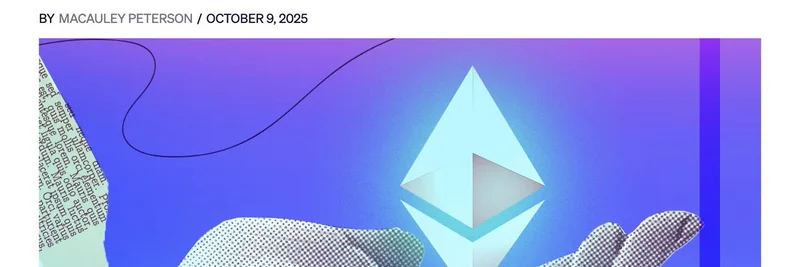Hey there, blockchain enthusiasts! If you're deep into meme tokens like the rest of us at Meme Insider, you know that Ethereum is the playground where most of these wild rides happen. But what if big money tried to call the shots? That's the juicy question raised in a recent tweet from Macauley Peterson, senior editor at Blockworks and a sharp voice on all things Ethereum.
In his post on X (formerly Twitter), Peterson drops a teaser: "A treasury can hold ETH. Only Ethereum decides who holds sway." He shouts out collaborators Ryan Watkins and Paul Dylan-Ennis (known as Polar on X) and links to his full article on Blockworks. It's a thoughtful piece that cuts through the hype around digital asset treasuries—or DATs for short—these are public companies stacking billions in crypto like ETH to boost their balance sheets.
Let's break it down simply. DATs, like BitMine Immersion led by Wall Street vet Tom Lee, are hoarding ETH at a crazy pace. BitMine alone holds about 3.75% of ETH's supply, according to Blockworks Research. That's no small potatoes! The article wonders if this could translate to real influence over Ethereum's direction. Think about it: if a company controls a massive chunk of ETH, could they steer protocol changes, like upgrades or governance decisions?
Ryan Watkins from Syncracy Capital thinks it's possible in the long run. He points out that as these treasuries grow, they might deploy ETH into DeFi protocols like Aave or even run validators and infrastructure. Imagine a DAT being a top depositor on a lending platform— their opinions on changes would probably get VIP treatment. Watkins even sketches a future where DATs hire talent or build core dev teams, subtly shifting priorities.
But hold up—Ethereum isn't like a traditional company where money equals votes. Paul Dylan-Ennis, a governance expert, argues that the protocol's setup is "messy" in the best way: decentralized, ideological, and resistant to corporate takeovers. Governance happens through things like AllCoreDevs calls, EIP editors, and community coordination—not boardrooms. To change Ethereum, you'd need buy-in from thousands of global node operators who prioritize ethos over profits. History backs this up; remember Bitcoin's block size wars or Ethereum's Merge? Big-money pushes often backfire, leading to forks that fizzle out.
The piece references Jo Freeman's essay on the "Tyranny of Structurelessness," highlighting how informal power can sneak in when things aren't explicit. But Ethereum's community is all about transparency and consensus, making it tough for any single entity to dominate. Vitalik Buterin himself has emphasized that Ethereum's moves have to rally the culture, not just a few wallets.
Now, why should meme token fans care? Meme coins thrive on Ethereum's fair, open ecosystem—think quick launches on platforms like Pump.fun or viral trades without gatekeepers. If corporate capture were easy, it could lead to favoritism, like prioritizing enterprise features over retail-friendly tools. But Peterson's take reassures us: Ethereum's "immune system" of decentralized nodes and stubborn idealism keeps it credibly neutral. That means more room for organic, community-driven memes to flourish without big players rigging the game.
Of course, it's early days for DATs. They're still in growth mode, and smaller ones are dipping toes into staking and DeFi. BitMine isn't staking directly yet, but if trends continue, we'll see how Ethereum's norms hold up. For now, it's a reminder that in crypto, true power comes from consensus, not just capital.
If you're building or trading meme tokens, keep an eye on governance chats—tools like EIPs could impact gas fees or scalability, directly affecting your next moonshot. What do you think: Could a DAT ever "buy" Ethereum, or is decentralization unbreakable? Drop your thoughts in the comments, and stay tuned to Meme Insider for more on how blockchain drama ties into the meme world.



